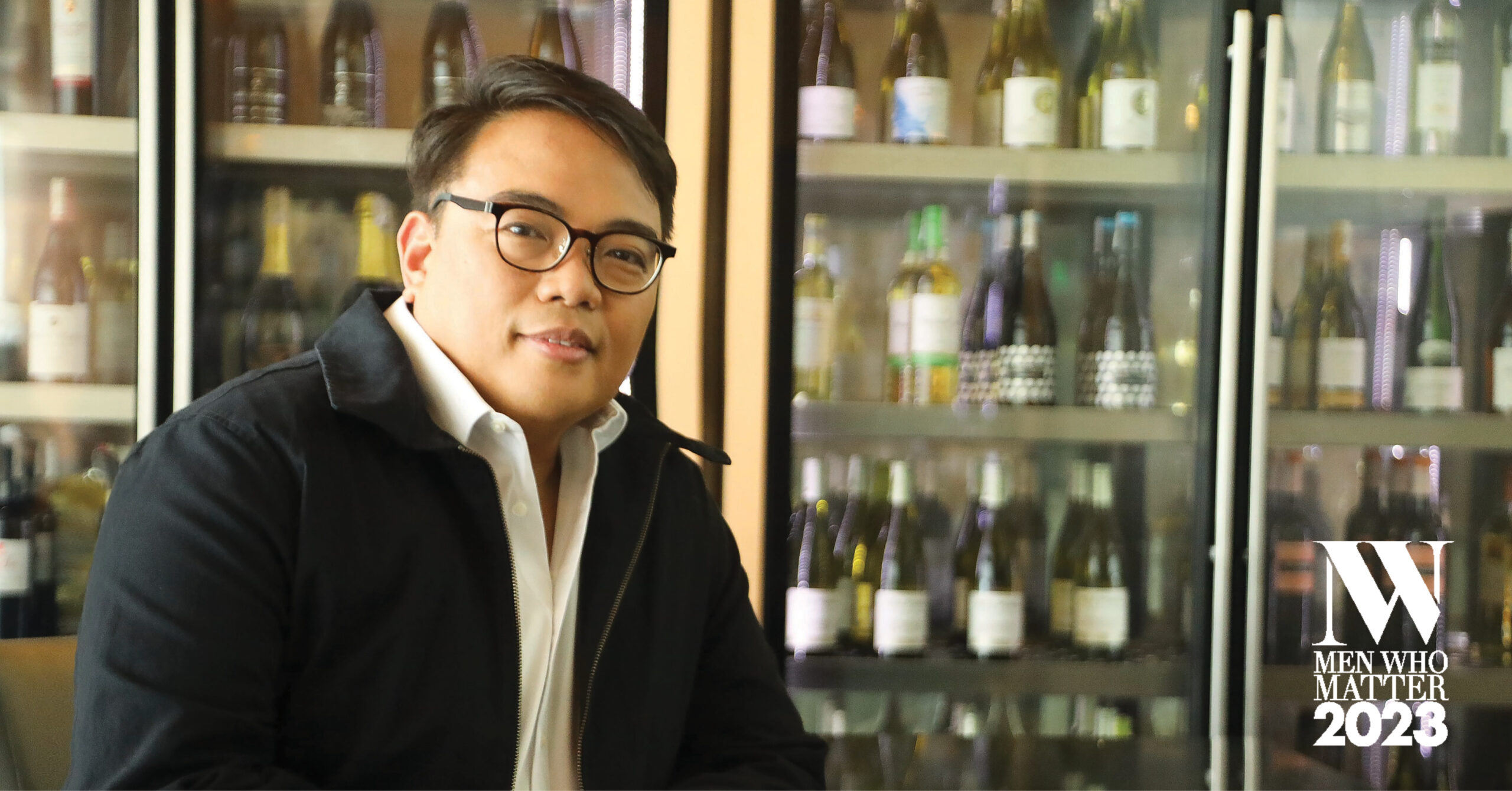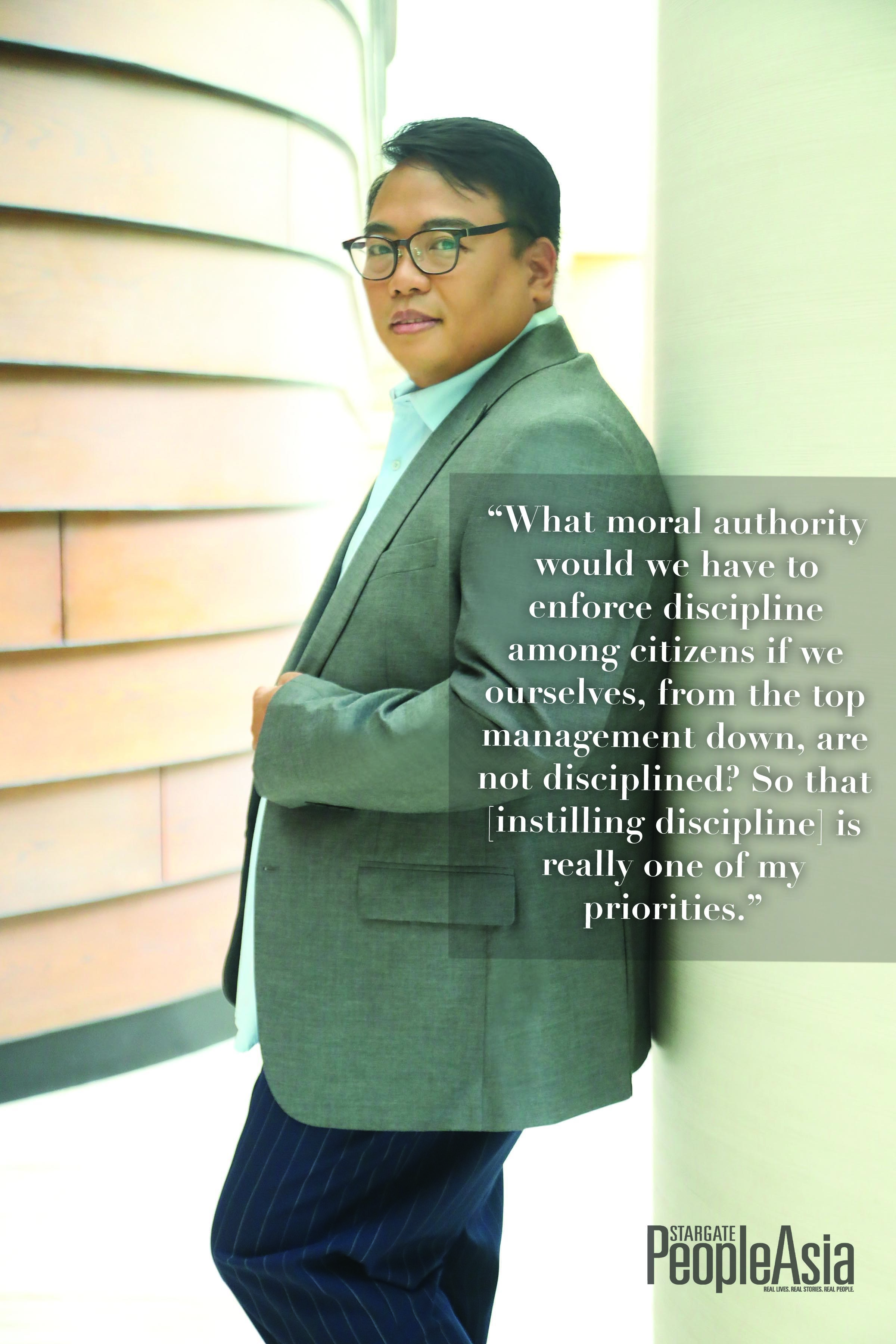With an infrastructure system that’s constantly straining to keep up with the needs of 14.7 million people, Metro Manila, which is composed of 16 cities and a lone municipality, needs someone with the vision, energy and political will to come up with creative and lasting solutions to these problems. Meet the man who has taken up the challenge.
By MAAN D’ASIS PAMARAN
Photography by RXANDY CAPINPIN
Since Metro Manila’s population won’t be decreasing any time soon, the quality of life in this dense, 620-sq.-km. megacity greatly depends on timely solutions and interventions in the areas of mobility, waste management, pollution control and public safety.
Such a herculean task, including all the headache and responsibilities it entails, falls squarely on the shoulders of lawyer Romando “Don” Artes, current chairman of the Metro Manila
Development Authority (MMDA). The man is mandated to make sure that the 16 cities and lone municipality within the NCR are livable, clean, green and orderly. And as everyone in Metro Manila knows, that’s easier said than done.
Innovative leadership
A Certified Public Accountant and lawyer by profession, obtaining both degrees from San Beda College in Manila, Artes graduated with an undergrad in Accountancy in 1993 and worked with prestigious accounting firm SGV & Co., before pursuing his Law degree. “My father is a lawyer and I felt inclined to follow in his footsteps,” he says.
Prior to his stint at the MMDA, he was part of Sen. Pia Cayetano’s staff in the Senate. At one point, he was also a consultant for the local government unit of his hometown, Biñan, Laguna. He soon caught the attention of then-MMDA chairman Danilo Lim, who invited him to join the agency. “I was his lawyer when he ran for election under the RAM partylist. When he recruited me to join MMDA, I declined three times because my law practice was doing well, and I was running our other businesses. He said, ‘just join us for a year, and then decide.’”
Artes is now going on his seventh year with the MMDA, where he started as an assistant general manager for finance and administration. It was during this time that MMDA was able to secure its ISO certification and an Unqualified Opinion from the Commission on Audit. “This means that our recording and other processes for handling the finances of MMDA are transparent. One of the ways we were able to achieve this is through digitalization of functions such as payroll and asset management. We also improved our reporting,” he explains.
The agency has also taken better care of its employees to discourage and minimize corruption among its ranks. “We raised their salaries because a lot of them were earning below minimum wage before. During my time as assistant general manager, until now as chairman, we were able to promote around 700 personnel from casual or job order to regular status so that they can receive more benefits. We make sure that they are protected on the job, with proper gear and equipment,” Artes tells us.
The agency has also partnered with several organizations to provide health insurance, as well as accidental and death benefits. They have signed an agreement with PhilHealth for their clinic’s accreditation so it can include additional medical and dental services for free. “We are really improving the situation of our employees. We also provide them with free shuttle services and free lunch for five days [of the workweek],” Artes says.
With these changes, morale is at an all-time high at the agency, he reports. The measures have also helped curb corruption in the organization — something that Artes takes seriously. “I created a task force that monitors all our enforcers all over Metro Manila, so that we can go after enforcers who collect bribes. Whenever we receive tip-offs about these enforcers, we monitor them, gather evidence, then take administrative action. If they are job-order employees, we show no mercy, we remove them right away.”
One of his missions is to instill discipline among MMDA employees. He explains, “What moral authority would we have to enforce discipline among citizens if we ourselves, from the top management down, are not disciplined? So that is really one of my priorities.”
Long-term planning
As the de facto administrator of NCR, he takes note of best practices in other countries as a model for what he wants to achieve in Metro Manila, citing a recent trip to the Netherlands together with some of the country’s city mayors. “We studied inclusive mobility, flood control and converting waste to energy. Insofar as inclusive mobility is concerned, we learned about the use of bicycle lanes and bikes in Amsterdam. Imagine, in the Dutch capital, there are three departments handling bikes alone — one each for infrastructure development, planning and cyclist behavior. It’s an entire package, really. Their waste-to-energy program, much like that of Germany and Japan, is designed to be feasible and sustainable so that they are able to recoup their investment and operational cost.”
Among the most celebrated reforms that Artes introduced is the Single Ticketing System, which seeks to establish an effective transport and traffic management system in Metro Manila while minimizing corruption between the driver and the enforcer. Aside from harmonizing existing national and local laws on traffic enforcement, the new system also makes it easier for violators to pay their fines online by visiting the website of the MMDA, LTO or the LGU where the ticket was issued.
“The proposal has been around since 1995, and we were able to arrange a compromise among the 17 LGUs of Metro Manila by addressing their concerns. Having this implemented after 28 long years is a personal achievement for me as a public servant and most especially as chairman of the MMDA.”
Artes also looked into the flood control program in Rotterdam, which has a 60-year plan and requires an assessment to be done after the first 30 years. This inspired him to replicate a similar system for Metro Manila. “I am setting aside funds for a comprehensive drainage master plan, which will serve as a bible for all stakeholders so that we can have a better idea on the design that is needed for our drainage system in its entirety. I envision a 40-year plan, which will be revisited after 20 years.” He has already commissioned a study on waste to energy solutions that look into Metro Manila and the suitable technology that can be used to deal with them.
He also places utmost importance on data to make decisions. “For me, all policies and decisions should be based on facts and data. For instance, we studied and conducted simulations on motorcyclist behavior on Commonwealth Avenue in Quezon City, where there is an average of five fatal accidents a day. Based on data, we instituted an exclusive motorcycle lane to keep them safe.”
Vision for the future
He spends his days in the office going through so much paperwork, he says, up to four or five boxes of correspondence a day, including letters sent to MMDA’s complaints center and from
the Presidential Action Center Hotline 888. “I want to be the one giving out instructions on how to respond and farm out concerns to be acted on immediately. I think that is also one of the reasons why we are a Hall of Famer for Freedom of Information. We are active on information dissemination and we act on all requests and complaints.” He then rushes home to spend dinner with his wife and three children. His weekends, as long as there’s no pressing problem that requires his immediate attention, are also spent with them.
Having grown up in the tranquil town of Biñan, with the nearby Laguna de Bay as his playground and a source of family income through his mother’s fish farm, Artes developed a respect and love for the environment early on. And this belief is reflected even while working in the Senate. He was the executive director of the Joint Oversight Committee of the Clean Air, Clean Water, Solid Waste Management Act, and championed laws to protect the Tubbataha Reef. A devoted family man, he was also instrumental in drafting the Anti-Child Pornography Law and the Magna Carta for Women.
He says environmental protection is an advocacy that’s close to his heart. “I love going scuba diving. I also like losing myself once in a while in our forests. The subdivision where I live in Antipolo has a lot of trees and, on a good day, you get a great view of Metro Manila. On a bad day, though, you can see the smog settling down on the cities. The environment has an impact on the mental and physical health of a country’s citizens,” he says. For its part, the MMDA funded and developed 17 pocket parks, from open spaces that have been provided by LGUs. “We have plans to develop more, but this time, we are incorporating food security by putting up edible gardens. We are active in estero clean-ups, and we also want to turn these esteros into parks,” he adds.
His vision for Metro Manila is for it to be clean, safe and flood-free, but, he continues, the MMDA can’t do its job properly without people’s help. “We need the cooperation of everyone. Just by throwing your trash, even a small candy wrapper, properly, you are already doing your part. We clean up tons of trash from our esteros regularly, and this causes problems such as flooding, traffic and health concerns, including leptospirosis. That little sacrifice of doing your duty as a citizen goes a long way,” he sums up.
Art direction by DEXTER FRANCIS DE VERA
Styling by PATTY YAP
Grooming by KLENG TOTANES







